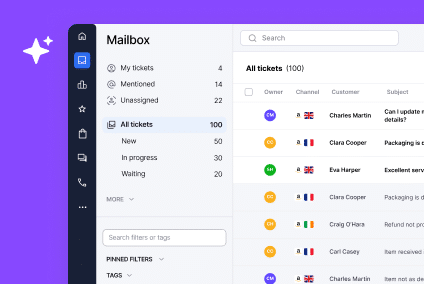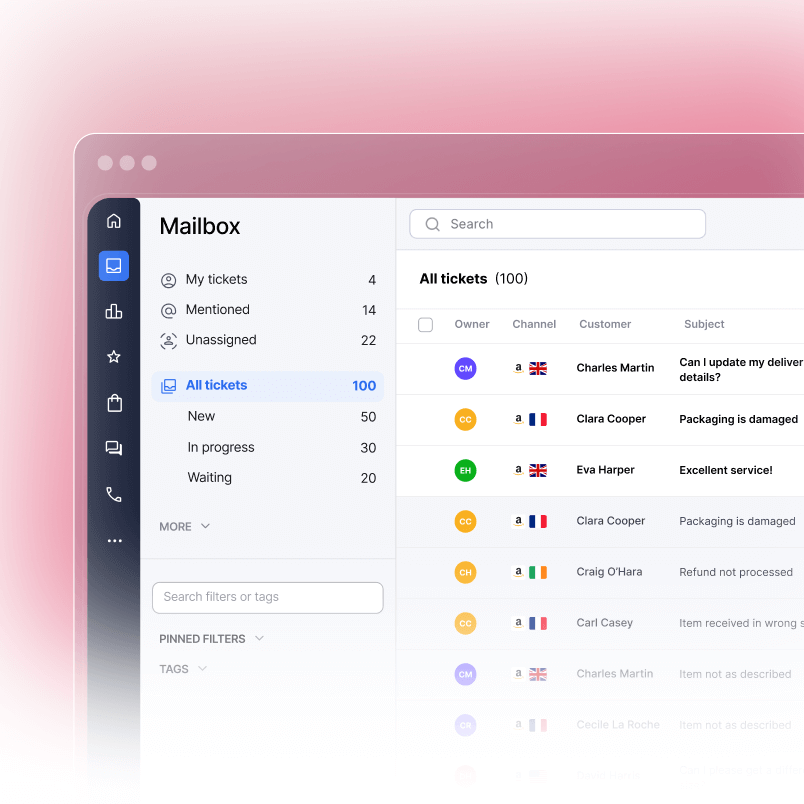For sellers operating across global Amazon marketplaces—from Germany and France to Japan—the language barrier is one of the most significant, yet overlooked, threats to compliance.
When a customer messages you in Japanese (FBM) or Italian (FBA), your ability to meet the mandatory 24-hour SLA collapses if your agent has to manually copy, paste, and translate the message using external tools.
This process introduces delays, translation errors, and high Average Handle Time (AHT). To succeed in global e-commerce, you must automate multilingual support, ensuring that every customer, regardless of language, receives a fast, accurate, and policy-compliant response within the critical 24-hour window.
The Global SLA Challenge: Language vs. Time
The core problem in global support is that every minute spent translating is a minute lost to the 24-hour SLA.
- Manual Translation Cost: When an agent uses an external translator (like Google Translate), they break the workflow, introduce potential human error (by misinterpreting a translated term), and delay the response. This dramatically increases First Response Time (FRT) and risks an SLA breach.
- Accuracy and Compliance: A mistranslated return policy or an incorrect instruction for an A-to-z claim defense can turn a simple ticket into a compliance failure, leading to a high Customer Service Dissatisfaction Rate (CSDR).
- Agent Fatigue: For multi-channel agents handling tickets from eBay UK, Amazon Germany, and Shopify US, switching languages constantly causes mental fatigue and increases the likelihood of errors.
The solution is an integrated system that makes translation an invisible, automatic part of the support process.
In global eCommerce, speed is compliance. If you can’t understand a customer in 60 seconds, you can’t resolve their issue in 24 hours. Automated translation is the only way to scale globally.
The Two Pillars of Automated Multilingual Support
To successfully maintain the 24-hour SLA on global marketplaces, your support system must execute two functions seamlessly:
- Instant, In-Context Translation: The system must automatically detect the language of the incoming message and translate it for the agent inside the help desk, and translate the agent’s reply back to the customer’s native language.
- Multilingual Macro Management: Agents must have access to pre-vetted, policy-compliant templates (macros) that are already translated into the required languages, ensuring complex policy statements are always delivered accurately.
Pillar 1: Instant, In-Context Translation
An integrated help desk removes the language barrier by using advanced AI/machine translation directly within the support ticket interface.
- Automatic Language Detection: When a message arrives from Amazon.de (Germany), the system instantly detects the German language.
- Side-by-Side View: The agent sees the original German text and the English translation side-by-side within the ticket. The agent types their response in English, and the system translates it back to German before it is sent through the Buyer-Seller Messaging Service.
- Global SLA Enforcement: Because the agent is not spending time on external translation, their FRT remains low, guaranteeing adherence to the 24-hour SLA across all global marketplaces.
Pillar 2: Multilingual Macro Management
Policy-critical statements (like those regarding FBM tracking or extended return windows) must be 100% accurate.
- Pre-Translated Templates: Instead of relying on real-time machine translation for every policy statement, the compliance team pre-translates all critical macros (e.g., “FBA Return Instructions”) into all supported languages (French, Spanish, Italian, etc.) and uploads them to the help desk.
- Agent Selection: The agent selects the required policy macro (e.g., “Tracking Status Confirmed”). The system knows the customer is speaking French and automatically inserts the French version of the macro, guaranteeing accuracy and compliance.
- Consistency: This ensures every customer, regardless of the marketplace, receives the exact same policy-compliant answer, reducing litigation risk and boosting customer confidence.
How eDesk Solves the Global Language Barrier
eDesk provides native, integrated translation capabilities designed specifically for high-volume, global e-commerce compliance:
- Unified Language Hub: By unifying tickets from Amazon EU (FR, ES, DE, IT), Japan, and other global channels, eDesk centralizes all language needs.
- Integrated Translator: The platform features an integrated translation tool that works automatically on both incoming and outgoing messages, maintaining the agent’s workflow and ensuring the 24-hour SLA is protected.
- Multilingual Macro Libraries: eDesk allows you to manage and lock down your pre-translated macro libraries, ensuring that your most critical compliance messages are delivered with 100% accuracy in every language required for your global footprint.
By implementing automated multilingual support, you can confidently scale your sales across global Amazon marketplaces without fear of language-induced compliance failures.
Key Takeaways and Next Steps
- Automate Translation: Eliminate manual, time-consuming translation by using a help desk with native, integrated translation to protect the 24-hour SLA.
- Pre-Translate Policy: For critical issues (returns, tracking), use pre-vetted, multilingual macros to ensure policy-compliant language is delivered accurately.
- Go Global Compliantly: Leverage these tools to confidently expand sales into high-growth but language-challenging regions like the EU and Japan.
To implement an automated, multilingual support solution and conquer the global Amazon marketplace, Book a Free Demo.
Frequently Asked Questions (FAQs)
Is machine translation accurate enough for Amazon support?
For general customer queries (like “Where is my package?”), machine translation is highly effective at conveying context. For policy-critical statements (like “Return Authorization Required”), it is safer to rely on pre-translated, vetted macros to ensure 100% compliance.
If I’m selling on Amazon Germany, does my support team have to be based in Germany?
No. By using automated multilingual support tools, your centralized support team (e.g., based in the US or UK) can handle German-language tickets with the same speed and accuracy as native speakers.
How do I prevent an agent from accidentally sending an English macro to a French customer?
A robust help desk like eDesk allows you to tag customers by language (based on the incoming message) and automatically displays the correct language macro set, minimizing agent error and guaranteeing the correct response.
Does a multilingual macro help with A-to-Z claim defense?
Yes. By using a pre-translated, policy-compliant macro to explain the resolution (e.g., “Full refund processed according to policy”), you provide Amazon with clear, auditable evidence in the customer’s native language that you followed the required steps, strengthening your defense.




